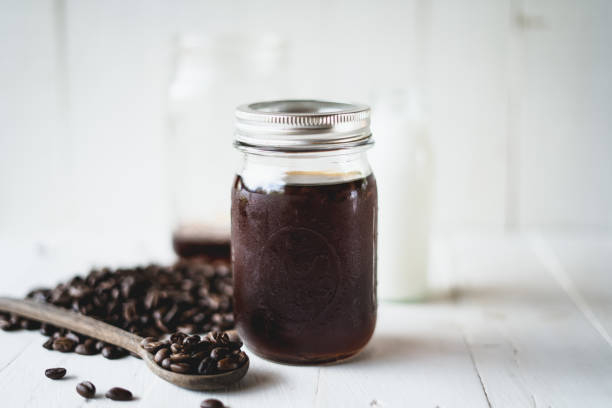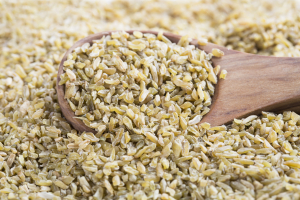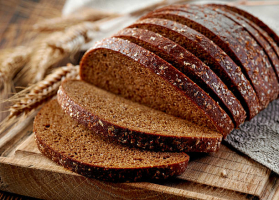Top 10 Health Benefits of Cold Brew Coffee
One of the most consumed beverages worldwide is coffee. More and more people are learning about cold brew coffee in recent years. Cold brew coffee is an ... read more...enjoyable alternative to hot coffee that you can easily make at home. Some have been attracted to claims that drinking cold brew coffee has a lot of benefits. The most notable health advantages of cold brew coffee are listed here.
-
Your body employs the metabolic process to turn food into energy. The more calories you burn when at rest, the greater your metabolic rate is. Cold brew coffee includes caffeine, which has been demonstrated to elevate your resting metabolic rate by as much as 11%. By speeding up the pace at which your body consumes fat, caffeine appears to increase metabolic rate.
In research with 8 males, caffeine consumption resulted in a 13% increase in calorie burning and a 2-fold increase in fat burning. These benefits were substantially bigger than those from taking a placebo or a beta-blocker, blood pressure, and circulation medicine.

May boost your metabolism 
May boost your metabolism -
Cold brew coffee contains caffeine, which may elevate your mood. It has been demonstrated that caffeine consumption improves mood, especially in people who lack sleep. A study of research involving more than 370,000 individuals discovered that coffee drinkers had a reduced incidence of depression. In fact, the risk of depression decreased by 8% for every cup of coffee drunk daily. According to some studies, caffeine may even be used as a dietary supplement to improve mood and cognitive performance in older persons.
In research involving 12 individuals, aged 63 to 74, caffeine intake of 1.4 milligrams per pound (3 milligrams per kilogram) enhanced mood by 17%. For a person of average size, this quantity of caffeine is comparable to around two cups of coffee. Additionally, caffeine enhanced their capacity to respond to an item coming toward them, demonstrating how it sharpens concentration and attention.

May lift your mood 
May lift your mood -
Coronary artery disease, heart attacks, and stroke are just a few of the illnesses that can harm your heart that is together referred to as "heart disease". It is the leading cause of death around the globe. Caffeine, phenolic compounds, magnesium, trigonelline, quinines, and lignans are some of the components found in cold brew coffee that may lower your risk of heart disease. These reduce blood pressure, regulate blood sugar, and improve insulin sensitivity. Diterpenes and chlorogenic acids (CGAs), which work as antioxidants and anti-inflammatory agents, are also present in the beverage.
When compared to persons who don't drink coffee, drinking three to five cups of coffee (15 to 25 ounces, or 450 to 750 ml) each day may reduce your risk of heart disease by up to 15%. Though this impact has not been researched in persons who use more than 600 mg of caffeine per day, which is comparable to 6 cups of coffee, there is insufficient evidence to show that consuming more than 3-5 cups per day increases the risk of heart disease. However, frequent caffeine use should be avoided by persons with uncontrolled high blood pressure since it may cause their levels to increase.

May lower your risk of heart disease 
May lower your risk of heart disease -
When you have type 2 diabetes, your blood sugar levels are chronically elevated. It can cause a variety of major health issues if left unchecked. Drinking cold brew coffee may lower your chances of getting this illness. In fact, a decreased incidence of type 2 diabetes is linked to daily coffee consumption of at least 4-6 cups. These advantages could be primarily attributed to chlorogenic acids, potent antioxidants found in coffee. Additionally, gut peptides, which are substances in your digestive tract that control and delay digestion and maintain stable blood sugar levels, may be regulated by cold brew coffee.
According to research including more than 36,900 participants between the ages of 45 and 74, those who drank at least 4 cups of coffee each day had a 30% reduced risk of type 2 diabetes than those who didn't. A study of three significant studies involving more than a million participants indicated that individuals who increased their coffee consumption over a period of four years had an 11% lower risk of type 2 diabetes, as opposed to those who raised their risk by more than one cup per day.

May lower your risk of type 2 diabetes 
May lower your risk of type 2 diabetes -
Cold brew coffee may enhance your mood and concentration while also having additional advantages for your brain. Your nervous system is stimulated by caffeine, which might have an impact on how your brain works. According to a recent study, drinking coffee might help keep your brain healthy as you age. Because Alzheimer's and Parkinson's are neurodegenerative illnesses, they are brought on by the gradual loss of brain cells. Both conditions can lead to dementia, a mental health condition that makes daily tasks challenging.
Parkinson's disease frequently results in physical tremors and stiffness, whereas Alzheimer's disease is characterized by substantial cognitive impairment. According to one observational research, those who drank 3-5 cups of coffee per day in their middle years had a 65% decreased chance of getting dementia and Alzheimer's disease in their later years. Different observational research discovered a decreased incidence of Parkinson's in coffee consumers. In fact, this illness is five times less likely to affect males who drink more than four cups of coffee every day. Many substances found in coffee, including phenylindanes and harman and nonharman substances, seem to offer defense against Alzheimer's and Parkinson's disease. Be aware that decaffeinated coffee does not seem to provide the same level of antioxidant protection as caffeinated versions.

May reduce your risk of Parkinson’s and Alzheimer’s disease 
May reduce your risk of Parkinson’s and Alzheimer’s disease -
Because coffee is an acidic beverage that may cause acid reflux, many individuals avoid it. Acid reflux is a disorder where your stomach acid repeatedly runs back into your esophagus, irritating it. Coffee's acidity is frequently cited as the cause of other conditions including indigestion and heartburn. From 0 to 14, the pH scale determines how acidic or alkaline a solution is, with 7 representing neutrality and lower values indicating greater acidity and higher numbers greater alkalinity.
Although this can vary depending on the specific brew, cold brew and hot coffee often have comparable acidity levels, ranging from roughly 5 to 6 on the pH scale. However, according to some research, cold brew is a little less acidic than hot coffee, which means it could not aggravate your stomach as much. Because it contains crude polysaccharides, this beverage may also be less irritating than hot coffee. These sugar molecule chains, or carbs, increase the digestive system's resistance. This can lessen stomach discomfort from coffee's acidity as well as intestinal irritability.

May be easier on your stomach than hot coffee 
May be easier on your stomach than hot coffee -
Drinking cold brew coffee may lower your chance of passing away from all causes as well as from diseases. The longer a person drinks coffee, the lower their chance of dying from heart disease, lung illness, stroke, injuries, accidents, diabetes, and infections, according to long-term research including 229,119 men and 173,141 women aged 50 to 71. Coffee's strong antioxidant content may be one explanation for this relationship.
Antioxidants are substances that aid in preventing cell damage that can result in chronic illnesses including cancer, type 2 diabetes, and heart disease. Your lifetime may be drastically shortened by certain disorders. Strong antioxidants such as polyphenols, hydroxycinnamates, and chlorogenic acid are present in coffee. Despite research showing that cold brew coffee includes certain highly effective antioxidants, such as caffeoylquinic acid, the former still contains more overall antioxidants than hot coffee (CQA).

May help you live longer 
May help you live longer -
A concentration of cold brew coffee is produced and is intended to be diluted with water, often in a 1:1 ratio. On its alone, the concentration is highly potent. In actuality, it contains roughly 200 milligrams of caffeine per cup when drunk undiluted. However, as is common, diluting the concentrate lowers the amount of caffeine in the finished beverage, bringing it closer to that of normal coffee.
Although the amount of caffeine might vary depending on the brewing technique, the difference between hot coffee and cold brew is negligible. Caffeine content for a standard cold brew is roughly 100 mg, compared to about 95 mg for a cup of hot coffee. Coffee is a popular beverage that researchers have studied extensively for its many health benefits, including its ability to increase energy levels, promote weight management, enhance athletic performance, and protect against chronic disease.

Similar caffeine content to hot coffee 
Similar caffeine content to hot coffee -
Research suggests that cold brew coffee may affect how fat is stored and promote intestinal health, both of which may help with weight control. For instance, a review of 12 research found that, especially in males, more coffee intake may be linked to lower body fat. Increased coffee consumption was associated with less body fat in women, according to another study.
In addition, compared to those who drank less than one cup per day, research indicated that individuals who drank one to two cups of coffee daily were 17% more likely to fulfill prescribed physical activity levels. Increased physical activity may aid in the promotion of weight management.

May promote weight management 
May promote weight management -
Athletes who want to enhance performance and boost energy frequently use cold brew coffee as an ergogenic aid. A performance enhancer is another name for an ergogenic aid. According to a study of nine research, consuming coffee before exercise increased endurance and lowered perceived effort when compared to a control group.
Even when researchers made adjustments for age, belly fat, and levels of physical activity, they discovered that consuming coffee was related to better physical performance and faster gait speed in 126 older persons. Additionally, a thorough analysis found that consuming modest amounts of coffee might marginally increase power production and time-trial completion. The researchers also warned that because the results were inconsistent, individual people may react differently to caffeine.

May enhance athletic performance 
May enhance athletic performance































